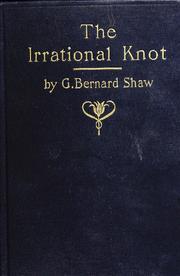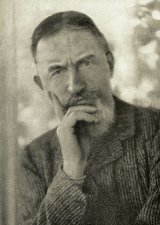The Irrational Knot Page #4
The Irrational Knot was first published in 1905, having been written in 1880. Within a framework of leisure class preoccupations and frivolities Shaw disdains hereditary status and proclaims the nobility of workers. Marriage, as the knot in question, is exemplified by the union of Marian Lind, a lady of the upper class, to Edward Conolly, always a workman but now a magnate, thanks to his invention of an electric motor that makes steam engines obsolete. The marriage soon deteriorates, primarily because Marian fails to rise above the preconceptions and limitations of her social class and is, therefore, unable to share her husband's interests.
In the days of The Irrational Knot I had not learnt this lesson; consequently I did not understand the British peerage, just as I did not understand that glorious and beautiful phenomenon, the "heartless" rich American woman, who so thoroughly and admirably understands that conscience is a luxury, and should be indulged in only when the vital needs of life have been abundantly satisfied. The instinct which has led the British peerage to fortify itself by American alliances is healthy and well inspired. Thanks to it, we shall still have a few people to maintain the tradition of a handsome, free, proud, costly life, whilst the craven mass of us are keeping up our starveling pretence that it is more important to be good than to be rich, and piously cheating, robbing, and murdering one another by doing our duty as policemen, soldiers, bailiffs, jurymen, turnkeys, hangmen, tradesmen, and curates, at the command of those who know that the golden grapes are not sour. Why, good heavens! we shall all pretend that this straightforward truth of mine is mere Swiftian satire, because it would require a little courage to take it seriously and either act on it or make me drink the hemlock for uttering it. There was the less excuse for my blindness because I was at that very moment laying the foundations of my high fortune by the most ruthless disregard of all the quack duties which lead the peasant lad of fiction to the White House, and harness the real peasant boy to the plough until he is finally swept, as rubbish, into the workhouse. I was an ablebodied and ableminded young man in the strength of my youth; and my family, then heavily embarrassed, needed my help urgently. That I should have chosen to be a burden to them instead was, according to all the conventions of peasant lad fiction, monstrous. Well, without a blush I embraced the monstrosity. I did not throw myself into the struggle for life: I threw my mother into it. I was not a staff to my father's old age: I hung on to his coat tails. His reward was to live just long enough to read a review of one of these silly novels written in an obscure journal by a personal friend of my own (now eminent in literature as Mr. John Mackinnon Robertson) prefiguring me to some extent as a considerable author. I think, myself, that this was a handsome reward, far better worth having than a nice pension from a dutiful son struggling slavishly for his parent's bread in some sordid trade. Handsome or not, it was the only return he ever had for the little pension he contrived to export from Ireland for his family. My mother reinforced it by drudging in her elder years at the art of music which she had followed in her prime freely for love. I only helped to spend it. People wondered at my heartlessness: one young and romantic lady had the courage to remonstrate openly and indignantly with me, "for the which" as Pepys said of the shipwright's wife who refused his advances, "I did respect her." Callous as Comus to moral babble, I steadily wrote my five pages a day and made a man of myself (at my mother's expense) instead of a slave. And I protest that I will not suffer James Huneker or any romanticist to pass me off as a peasant boy qualifying for a chapter in Smiles's Self Help, or a good son supporting a helpless mother, instead of a stupendously selfish artist leaning with the full weight of his hungry body on an energetic and capable woman. No, James: such lies are not only unnecessary, but fearfully depressing and fundamentally immoral, besides being hardly fair to the supposed peasant lad's parents. My mother worked for my living instead of preaching that it was my duty to work for hers: therefore take off your hat to her, and blush.[A] It is now open to anyone who pleases to read The Irrational Knot. I do not recommend him to; but it is possible that the same mysterious force which drove me through the labor of writing it may have had some purpose which will sustain others through the labor of reading it, and even reward them with some ghastly enjoyment of it. For my own part I cannot stand it. It is to me only one of the heaps of spoiled material that all apprenticeship involves. I consent to its publication because I remember that British colonel who called on Beethoven when the elderly composer was working at his posthumous quartets, and offered him a commission for a work in the style of his jejune septet. Beethoven drove the Colonel out of the house with objurgation. I think that was uncivil. There is a time for the septet, and a time for the posthumous quartets. It is true that if a man called on me now and asked me to write something like The Irrational Knot I should have to exercise great self-control. But there are people who read Man and Superman, and then tell me (actually to my face) that I have never done anything so good as Cashel Byron's Profession. After this, there may be a public for even The Irrational Knot; so let it go. LONDON, May 26, 1905. [Footnote A: James, having read the above in proof, now protests he never called me a peasant lad: that being a decoration by the sub-editor. The expression he used was "a poor lad." This is what James calls tact. After all, there is something pastoral, elemental, well aerated, about a peasant lad. But a mere poor lad! really, James, really--!!!] P.S.--Since writing the above I have looked through the proof-sheets of this book, and found, with some access of respect for my youth, that it is a fiction of the first order. By this I do not mean that it is a masterpiece in that order, or even a pleasant example of it, but simply that, such as it is, it is one of those fictions in which the morality is original and not readymade. Now this quality is the true diagnostic of the first order in literature, and indeed in all the arts, including the art of life. It is, for example, the distinction that sets Shakespear's Hamlet above his other plays, and that sets Ibsen's work as a whole above Shakespear's work as a whole. Shakespear's morality is a mere reach-me-down; and because Hamlet does not feel comfortable in it, and struggles against the misfit, he suggests something better, futile as his struggle is, and incompetent as Shakespear shews himself in his effort to think out the revolt of his feeling against readymade morality. Ibsen's morality is original all through: he knows well that the men in the street have no use for principles, because they can neither understand nor apply them; and that what they can understand and apply are arbitrary rules of conduct, often frightfully destructive and inhuman, but at least definite rules enabling the common stupid man to know where he stands and what he may do and not do without getting into trouble. Now to all writers of the first order, these rules, and the need for them produced by the moral and intellectual incompetence of the ordinary human animal, are no more invariably beneficial and respectable than the sunlight which ripens the wheat in Sussex and leaves the desert deadly in Sahara, making the cheeks of the ploughman's child rosy in the morning and striking the ploughman brainsick or dead in the afternoon; no more inspired (and no less) than the religion of the Andaman islanders; as much in need of frequent throwing away and replacement as the community's boots. By writers of the second order the readymade morality is accepted as the basis of all moral judgment and criticism of the characters they portray, even when their genius forces them to represent their most attractive heroes and heroines as violating the readymade code in all directions. Far be it from me to pretend that the first order is more readable than the second! Shakespear, Scott, Dickens, Dumas père are not, to say the least, less readable than Euripides and Ibsen. Nor is the first order always more constructive; for Byron, Oscar Wilde, and Larochefoucauld did not get further in positive philosophy than Ruskin and Carlyle, though they could snuff Ruskin's Seven Lamps with their fingers without flinching. Still, the first order remains the first order and the second the second for all that: no man who shuts his eyes and opens his mouth when religion and morality are offered to him on a long spoon can share the same Parnassian bench with those who make an original contribution to religion and morality, were it only a criticism.
Translation
Translate and read this book in other languages:
Select another language:
- - Select -
- 简体中文 (Chinese - Simplified)
- 繁體中文 (Chinese - Traditional)
- Español (Spanish)
- Esperanto (Esperanto)
- 日本語 (Japanese)
- Português (Portuguese)
- Deutsch (German)
- العربية (Arabic)
- Français (French)
- Русский (Russian)
- ಕನ್ನಡ (Kannada)
- 한국어 (Korean)
- עברית (Hebrew)
- Gaeilge (Irish)
- Українська (Ukrainian)
- اردو (Urdu)
- Magyar (Hungarian)
- मानक हिन्दी (Hindi)
- Indonesia (Indonesian)
- Italiano (Italian)
- தமிழ் (Tamil)
- Türkçe (Turkish)
- తెలుగు (Telugu)
- ภาษาไทย (Thai)
- Tiếng Việt (Vietnamese)
- Čeština (Czech)
- Polski (Polish)
- Bahasa Indonesia (Indonesian)
- Românește (Romanian)
- Nederlands (Dutch)
- Ελληνικά (Greek)
- Latinum (Latin)
- Svenska (Swedish)
- Dansk (Danish)
- Suomi (Finnish)
- فارسی (Persian)
- ייִדיש (Yiddish)
- հայերեն (Armenian)
- Norsk (Norwegian)
- English (English)
Citation
Use the citation below to add this book to your bibliography:
Style:MLAChicagoAPA
"The Irrational Knot Books." Literature.com. STANDS4 LLC, 2024. Web. 22 Dec. 2024. <https://www.literature.com/book/the_irrational_knot_7>.




Discuss this The Irrational Knot book with the community:
Report Comment
We're doing our best to make sure our content is useful, accurate and safe.
If by any chance you spot an inappropriate comment while navigating through our website please use this form to let us know, and we'll take care of it shortly.
Attachment
You need to be logged in to favorite.
Log In